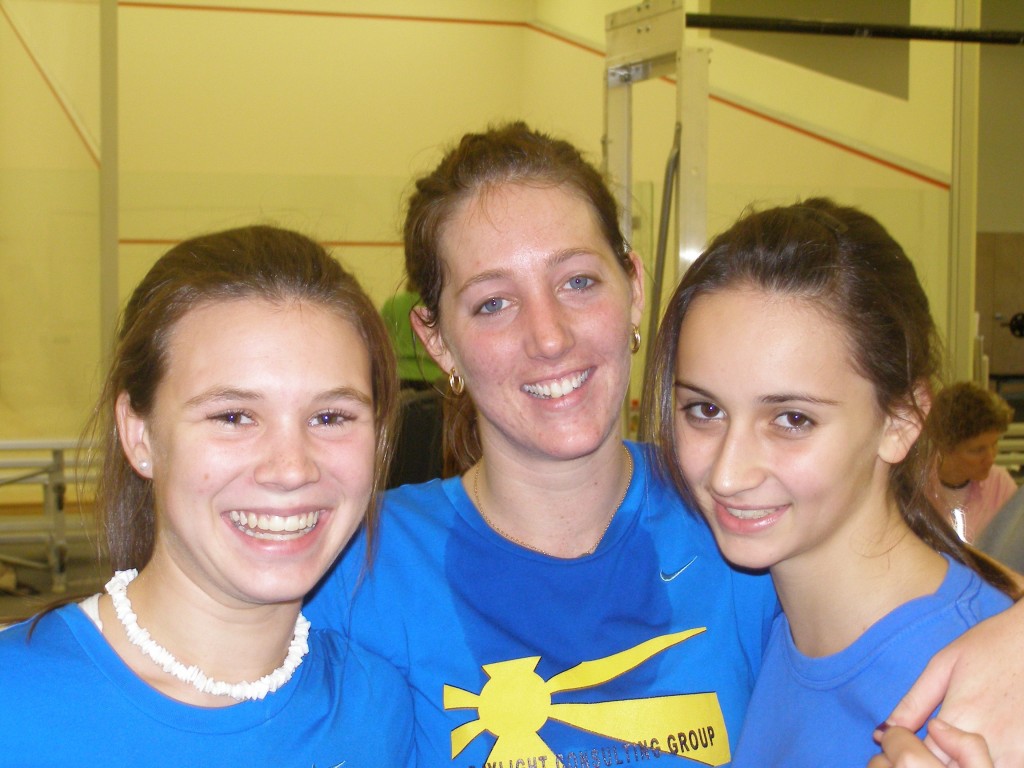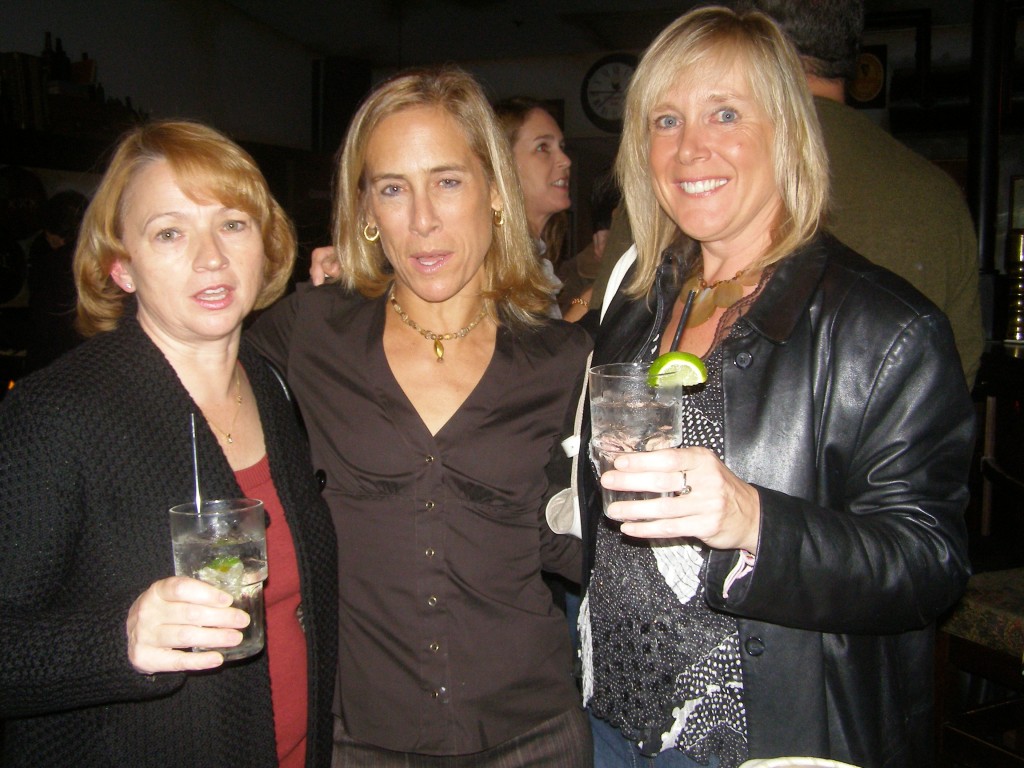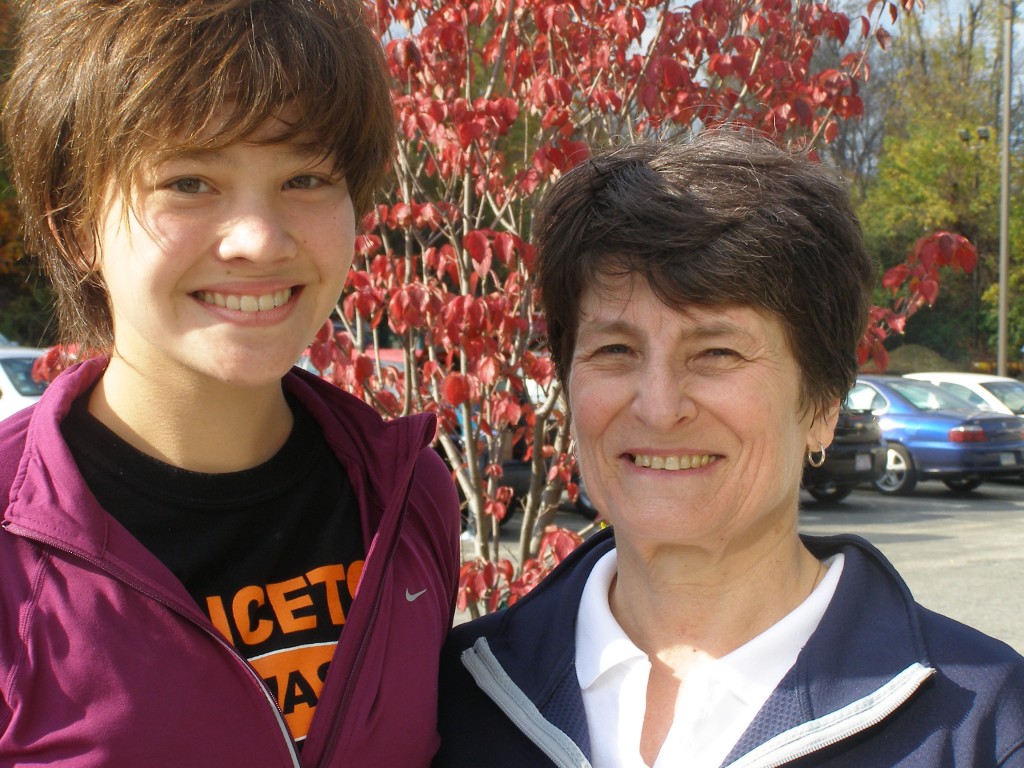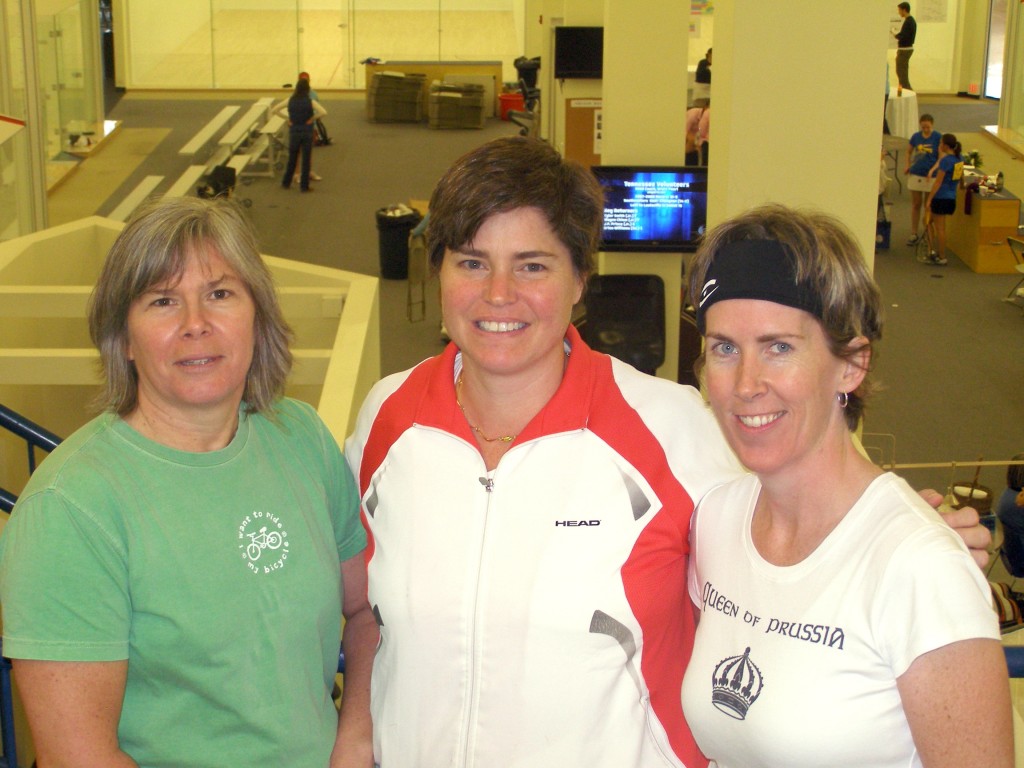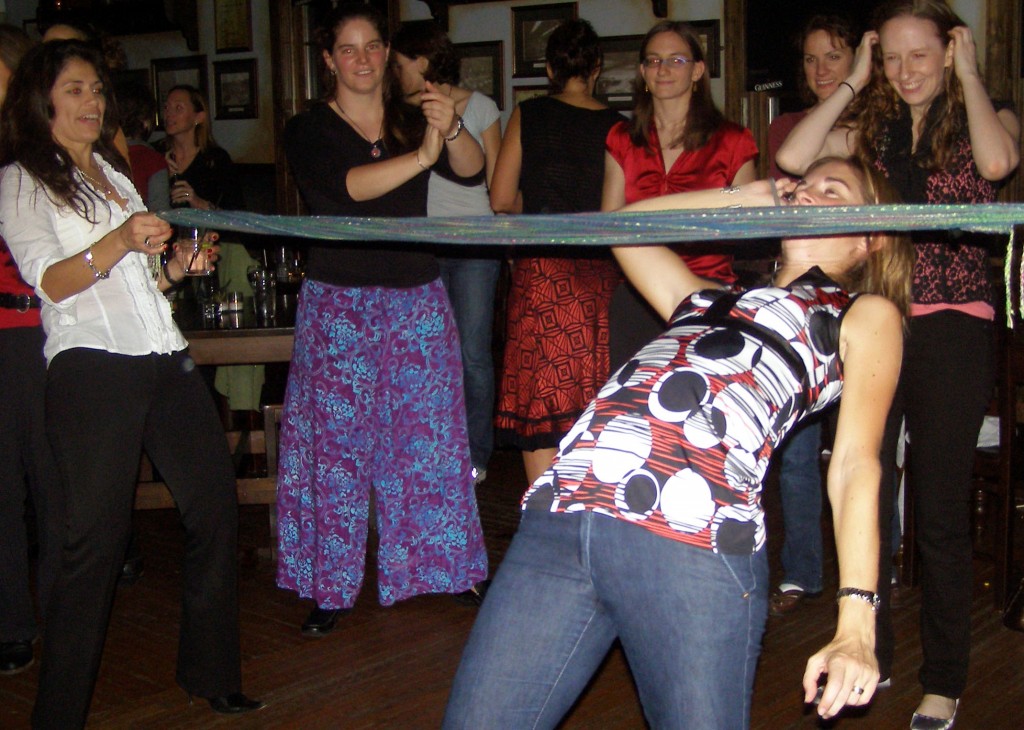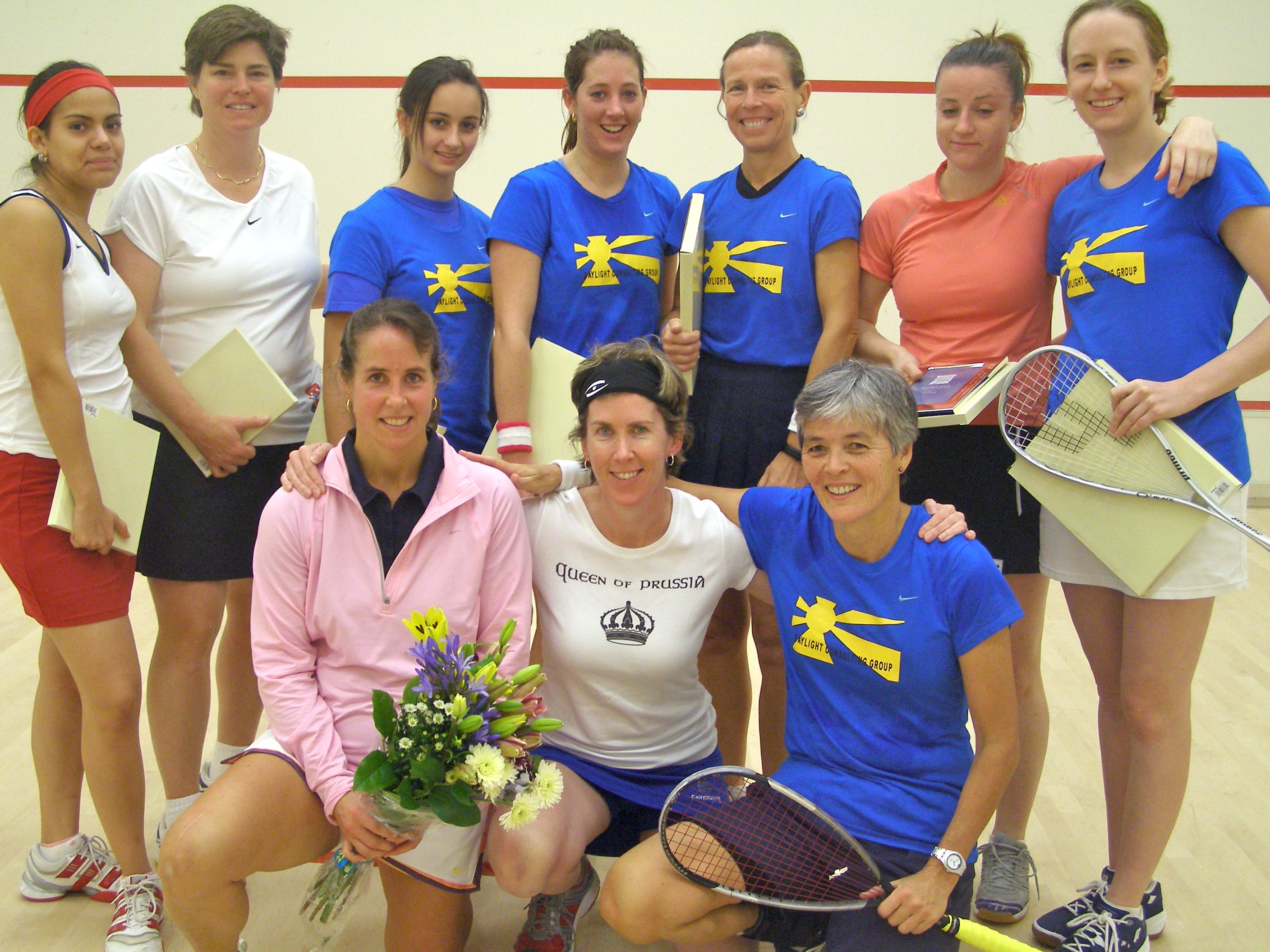
By Beth Rasin
From the host venue to the 200 players participating, Howe Cup 2008 exemplified the love of the game that inspired the creation of this team event in 1928 and has carried it to new heights 80 years later. It was particularly fitting that just two months after the death of Betty Howe Constable, the championship that was named for Betty, her mother and sister, should brim with the exuberance that Betty herself brought to the sport.
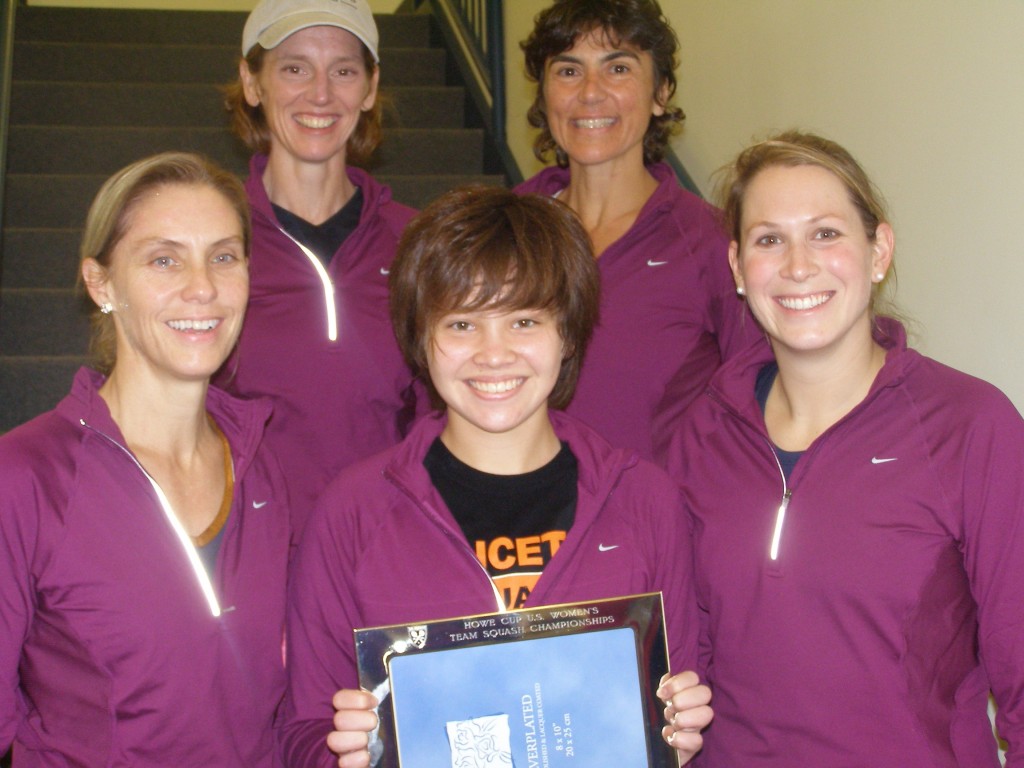
For 12-time national singles champion Demer Holleran, hosting Howe Cup was a dream realized. Part of Holleran’s vision in developing the Fairmount Athletic Club, the championship venue, was the ability to have major national events under one roof. Fairmount proved to be ideally suited to hosting 200 players playing nonstop squash for three days on the Club’s 12 singles courts. Playing squash was only part of the weekend’s pleasure; cheering teammates in other flights, catching up with old friends and making new ones were all part of the Howe Cup experience. Holleran, who hadn’t competed in Howe Cup for several years, even got back on the courts herself, playing No. 4 on the Philadelphia A team where she was undefeated for the weekend.
Another National Champion proved that squash is a lifetime sport when she took to the courts for the Philadelphia B team. Joyce Davenport, who played in her first Howe Cup some 45 years ago, had all the players and spectators shaking their heads in amazement as she battled players decades younger with the same deft shotmaking and precision that made her a national champion.
The National Capitol region was especially well represented, with three finalist teams, two of which secured the championship cup. The champions in all four flights were determined by the smallest margin of victory as each showdown was decided by a 3-2 score. A growing contingent of teenagers participated, injecting a welcome dose of youthful ebullience to match the enthusiasm of the more mature players who revel in the weekend of continuing competition and delight in the company of so many other sweaty women.
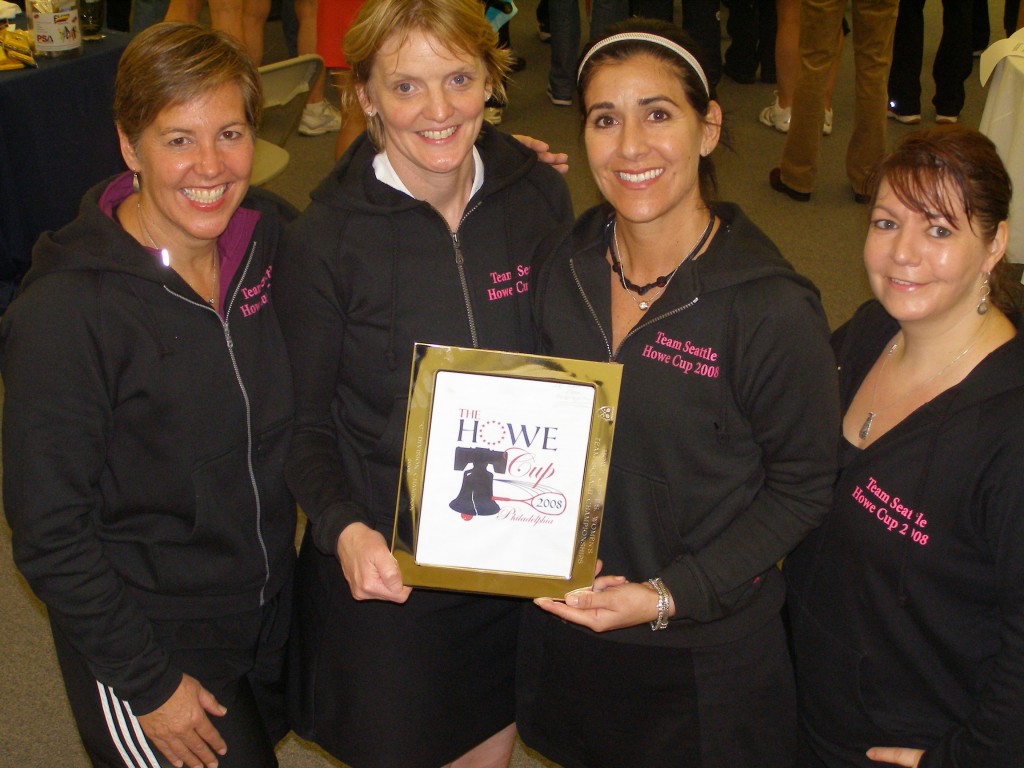
There were 40 teams representing 11 regions with players ranging in age from 14 to 68. Some women have played the game for forty years or more, others have just been introduced to the sport. The players were all shapes, sizes, nationalities, but united in their enthusiasm for Howe Cup and their love of the game.
National Capitol Surprise A Winner
A multi-generational team from the nation’s capitol surprised themselves and everyone else when they ended the Howe Cup stranglehold that saw Boston and Philadelphia in the finals for the past four years. “This was totally unexpected, especially since we placed dead last a year ago,” said 50-year-old Bettina Aten, who secured her team’s place in the final with a five game match-deciding win over Philadelphia’s Amy Milanek, one of the event organizers.
With No. 1 Larissa Stephenson, a New Zealander and recent Trinity College graduate, defeating fellow WISPA competitor Tina Rix in four games, and former Yale standout Michelle Quibell overwhelming Orla Dougherty in three games, Aten’s second victory over Milanek, a 3-0 win in the finals, sent the coveted Cup to the nation’s capitol. “This win was about real dedication—we practiced really hard—and real grit,” said team captain Carole Grunberg, who delighted in noting that there was a 40 year age difference between herself and the team’s youngest player—15-year old Camille Lanier. The victory was especially sweet for Aten and Grunberg, each of whom declared that this was their last Howe Cup competition at the A level of play. “My body just can’t take it anymore,” said Aten, who was scheduled for ankle surgery the week after the championships.
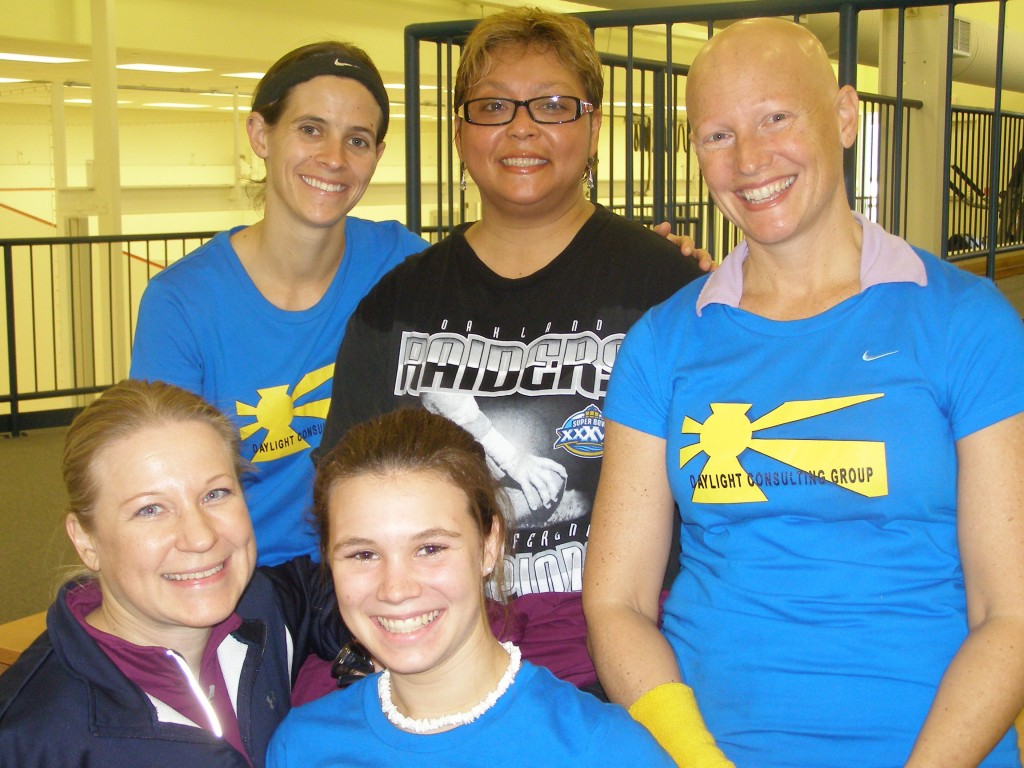
Finals:
National Capitol (3) Philadelphia A1 (2)
1. Larissa Stephenson d. Tina Rix 5, 5, (4), 3
2. Michelle Quibell d. Orla Dougherty 0, 4, 6
3. Bettina Aten d. Amy Milanek 7, 5, 6
4. Carole Grunberg lost to Demer Holleran 1, 5, 3
5. Camille Lanier lost to Ileana Novelo (4), 2, 1, 3
3/4 Playoff:
Boston (4) California Coasters (1)
1. Shona Kerr d. Melin Ong (8-10), 6, 10-8,4
2. Isabel Restrepo lost to Niki Clement 5, 3, 0
3. Fernanda Rocha d. Kim Clearkin (9), 5, 0, 5
4. Szilvie Szomboti d. Deb Phippard 3, 3, 2
5. Jeannie Blasberg d. Kristen Waters 4, 4, 3
5/6 Playoff:
Philadelphia A2 (4) Connecticut (1)
1. Kelsey Engman d. Julie Hisey 3, 4, 2
2. Dawn Gray lost to Katja Amir 7, (7), (8-10), 10-8, 4
3. Stephanie Walters d. Beatrice Querel 3, 3, 9
4. Julie Kessler d. Bridget Di Bonnaventura 3, 0, 2
5. Margaret Rux d. Jesse Anderson 6, 2, 1
Baltimore Ekes Out B Cup Clincher
The remarkable Joyce Davenport kept Philadelphia’s hopes alive in the B finals when she commandeered a five game victory over 15-year-old Lindsay Wong. The young Baltimorean demonstrated great poise when she evened the match at two all after losing the first two games. But the 66-year-old veteran was not about to let the match slip away and, with a 9-6 fifth game win, kept the Philly hopes alive. With Anna Wallace winning her match at No. 4 over Sarah Evans, Philadelphia needed just one more match win. But the trio at the top of the Baltimore line up—Lissen Tutrone, Liz Everts and Liz Tarran-Jones—were just too good. Tutrone defeated Erika Lacerda in three games, and Everts did the same in her match against Tracy Greer. Tarran-Jones stood up to the pressure of having the match rest on her shoulders, defeating Ann Hatfield in four games to take the Cup south of the Mason-Dixon line.
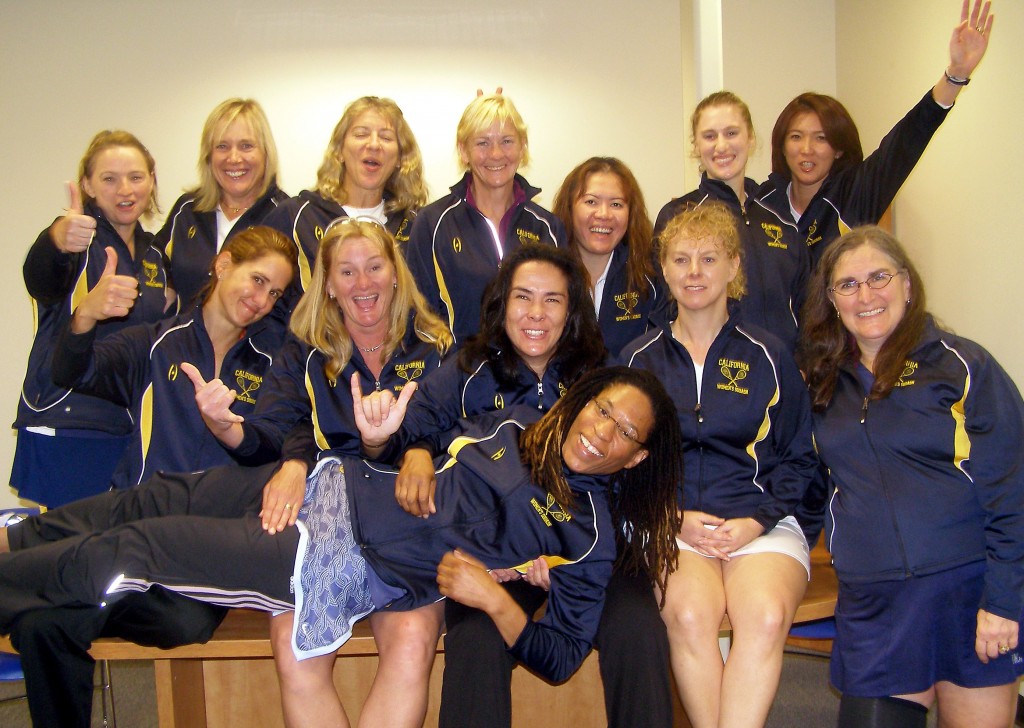
Finals:
Baltimore (3) Philadelphia B1 (2)
1. Lissen Tutrone d. Erika LaCerda 2, 2, 0
2. Liz Everts d. Tracy Greer 7, 4, 5
3. Liz Tarran-Jones d. Ann Hatfield (3), 2, 1, 2
4. Sarah Evans lost to Anna Wallace 4, 1, 5
5. Lindsay Wong lost to Joyce Davenport 5, 0, (6), (1), 6
3/4 Playoff:
New Jersey (3) Connecticut (2)
1. Amalia Londono d. Liz Solovay 7, 7, 5
2. Jill Steck lost to Jane Segal 5, 5, 3
3. Jill Gaskell d. Barbara Keil 10-8, 4, (8-10), 1
4. Dee Schmitz d. Julia Lane (4), 2, (1), 3, 2
5. Ann Mandel lost to Jen Gabler 4, 2, 3
Consols:
Boston B1 (4) Seattle (1)
1. Corey Schafer d. Kathryn Grant 10-8, (3), 2, 3
2. Kara Kardon d. Lulu Chou (7), (1), 4, 4, 6
3. Bry Roskoz d. Susan Lehr 4, 0, 9
4. Chrisy Jones lost to Brandi Conforth 5, 6, 4
5. Betsy Hargreaves d. Dominique Posy 5, 7, 3
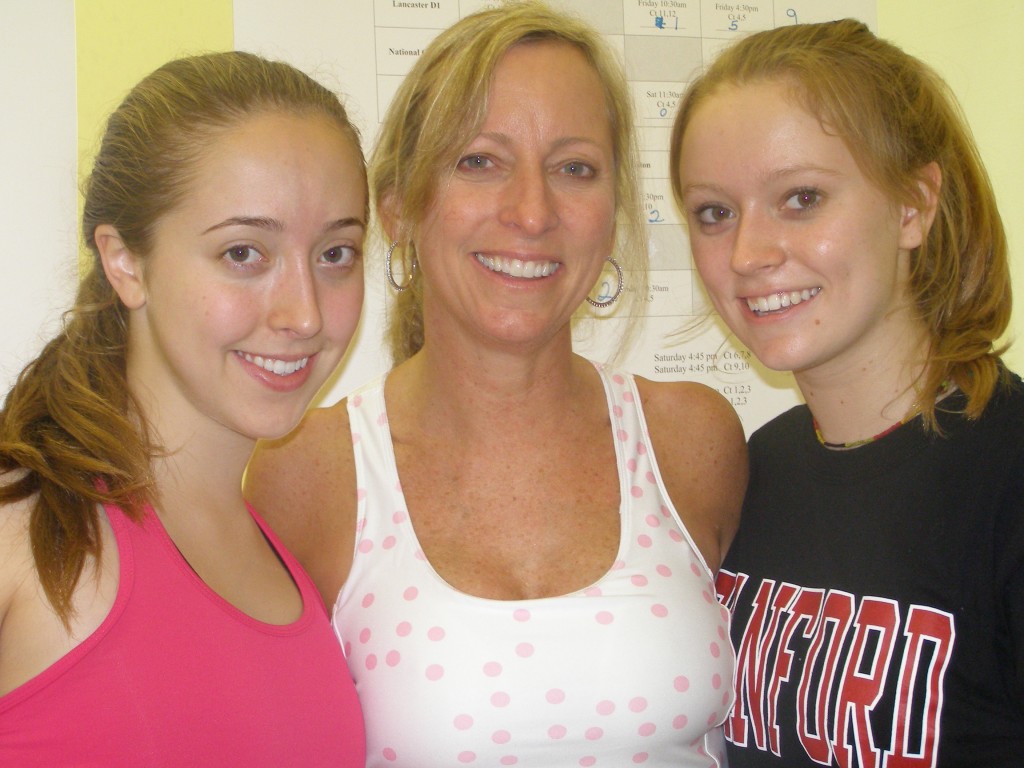
Seattle Seizes Victory in the Cs
Seattle has long been known for their great enthusiasm for Howe Cup, fielding at least two teams every year no matter where event is played, showing up in matching outfits (always with a pink twist) and dancing up a storm at the Saturday night party. The enthusiasm hadn’t resulted in a Cup victory for the Seattle C players until this year when the women from the northwest squeezed by the National Capitol squad.
Cindy Shurtleff and Julie Santos gave Seattle a 2-0 lead with straight game victories over Jane Collins and Donna Sharpe. Although Heidi Fisher held off Bernie McLaughlin and Elsabe Darling defeated Julie Agel to keep the National Capitol hopes alive, Bettina Muench ensured that Seattle would have a Howe Cup to call their own when she defeated Sidney Kiniram in three games.
Finals:
Seattle (3) National Capitol (2)
1. Bettina Muench d. Sidney Kiniram 1, 5, 4
2. Julie Santos d. Donna Sharpe 4, 2, 0
3. Julie Agel lost to Elsabe Darling 0, 0, 4
4. Bernie McLaughlin lost to Heidi Fisher 2, 4, 6
5. Cindy Shurtleff d. Jane Collins 7, 4, 5
3-4 Boston C2 def. Boston C1 (4-1)
Consols Baltimore C1 def. Portland (4-1)
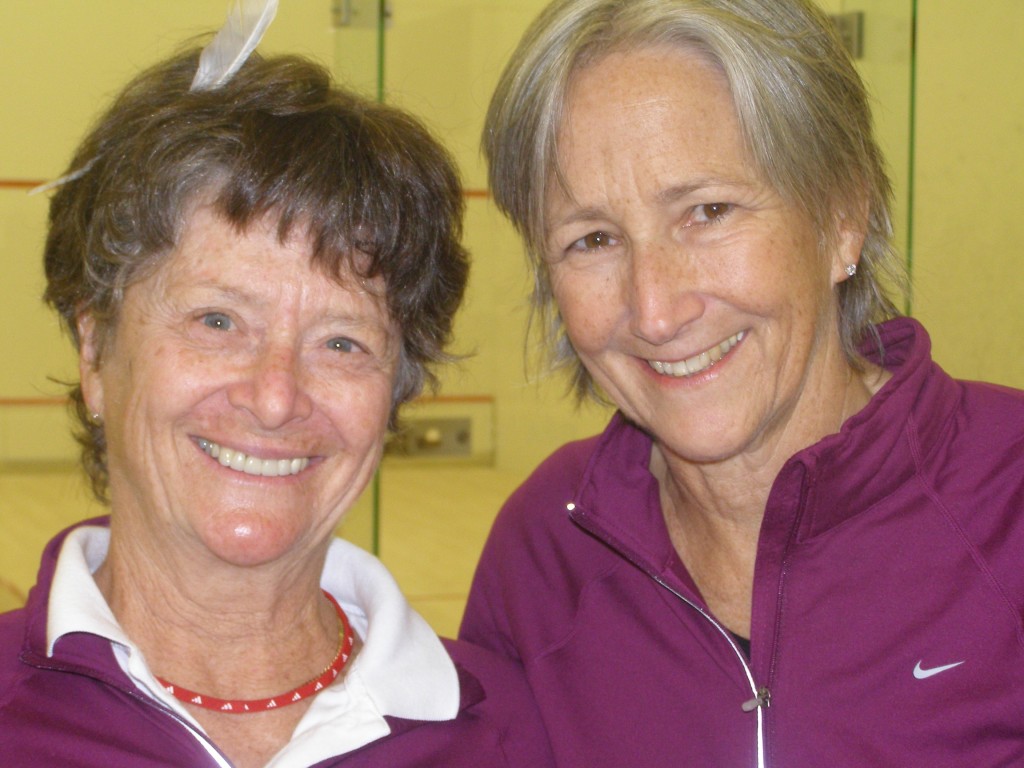
National Capitol Ds Double Down
“All I knew was that I could not lose this match,” said Mona Butterfield, the No. 3 player on the National Capitol D squad. Her determination paid off in spades—a victory over Lancaster’s Jess May in four games meant that the National Capitol women would join their teammates on the A team as Howe Cup champions. Lancaster’s Sofia Ruiz had triple bageled Elena Guarinello and Lisa Groff had defeated National Capitol’s Christi Terzak. With National Capitol teenager Anne Bellinger dispatching Lancaster’s Beth Proffitt and No. 5 Wendy Hall defeating Anne Dana, it was up to Butterfield to seal the victory.
“This is just unreal,” Butterfield said after the match. “I have been playing Howe Cup since 1984, and this is the first time that I have been on a winning team. But I had a feeling we were going to win this year. We had early commitments from team members and good training sessions.”
The women from Lancaster were delighted with their second place finish. They lauded Jess May for hanging tough despite losing her match, especially noting that she came back from being down 7-0 in the third game to take it to a tiebreak. They praised their No. 5 player, Ann Dana, whose sister Jess May recruited her to join the team at the 11th hour. Dana had never held a squash racquet in her hands before arriving at the Fairmount Athletic Club on Friday, but gamely took to the courts and got better with each match. “Lancaster is not exactly the mecca of squash,” Lisa Groff noted wryly. “We are happy to be here at Howe Cup with two teams, incredibly excited to have been in the finals, and looking forward to going wherever Howe Cup is played next year!”
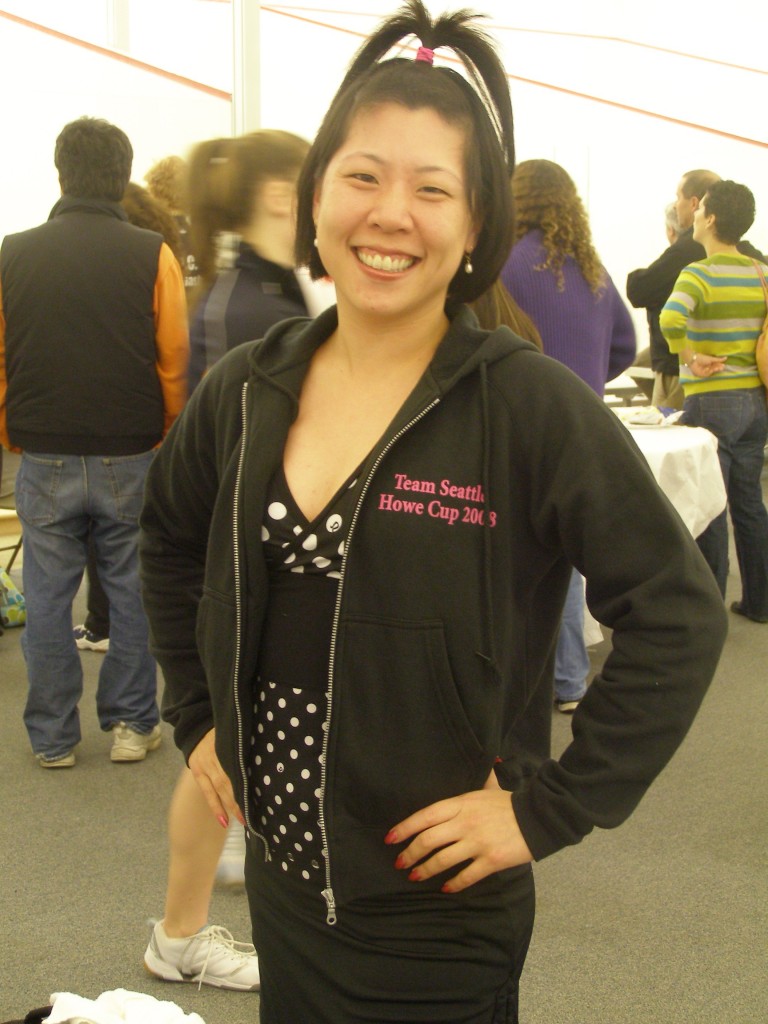
Finals:
National Capitol (3) Lancaster D1 (2)
1. Elena Guarinello lost to Sofia Ruiz 0, 0, 0
2. Christi Tezak lost to Lisa Groff 10-9, (7), 5, 3
3. Mona Butterfield d. Jess May (7), 1, 10-8, 3
4. Anne Bellinger d. Beth Proffitt 1, 6, 0
5. Wendy Hall d. Anne Dana 3, 0, 0
3/4 Playoff:
Boston (4) Philadelphia (1)
1. Sarah Lemaire d. Teri Schwartz 0, (4), 6, 2
2. Susan Mygati lost to Sharon Schwarze 6, 0, 1
3. Melanie Bianchi d. Delma Broussard 7, 1, 5
4. Sherry McAdams d. Grace Hall 5, 9, 3
5. Lisa Griffith d. Meg Zarfos 7, 2, 1
5/6 Playoff
Lancaster D2 (3) Baltimore (0)
1. Maura Umble d. Abby Markoe 2, 2, 3
2. Barbara Bee d. Susan Saudek 4, 3, 2
3. Molly Umble d. Kimberley Warren (6), (7), 2, 9, 3
High on Howe Cup
Teammates on Baltimore’s D team, Susan Saudek and Kimberley Warren, made sure that Howe Cup took precedence on their calendars. Susan’s daughter was originally scheduled to give birth on Howe Cup Weekend, but managed to grant her Mom’s request to deliver early. Kimberley’s friends graciously agreed to change the date of their annual women’s weekend so she could compete.
Kimberley, who finds “the team thing very appealing,” gave a nod to Baltimore organizer Ann Watson as the prime motivator for the strong Baltimore presence at Howe Cup. “Once Ann has you, she doesn’t let you off the hook. And she brings great fun to the whole thing.”
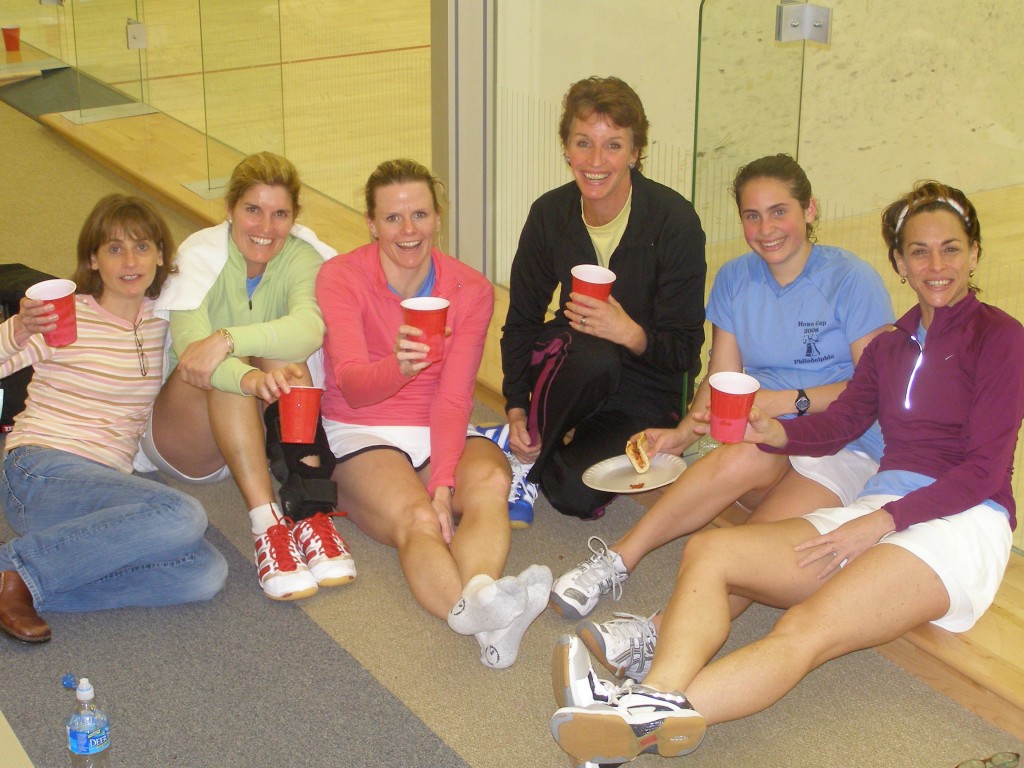
Saudek, at 68, was one of the oldest, and most enthusiastic, competitors on court. Born and raised in Argentina, where she played field hockey and tennis, Saudek came to the US at age 25 to study biochemistry at Elmira College in New York. After working at the Rockefeller Institute, she moved to Baltimore where she first took up squash. For the last 20 years, Saudek has worked with a non profit in El Salvador, where she lived for a period of time. “We moved to the villages that were under threat of violence due to the war, and basically served as human shields to prevent the villagers from being attacked.” Saudek has also been involved in development work and the education of women.
Reflecting on what makes Howe Cup so compelling, Saudek mused, “The competitiveness among the women is accompanied by such a great spirit…and the fact that I can still do it. I am going to figure out how to keep doing it!”
The family that trains together, plays together, has fun together
“It is amazing to have played so long that my teenage girls are playing Howe Cup with me,” Laurie Miller said with obvious delight midway through Howe Cup weekend. “I love it when they cheer, ‘Go Mom!’”
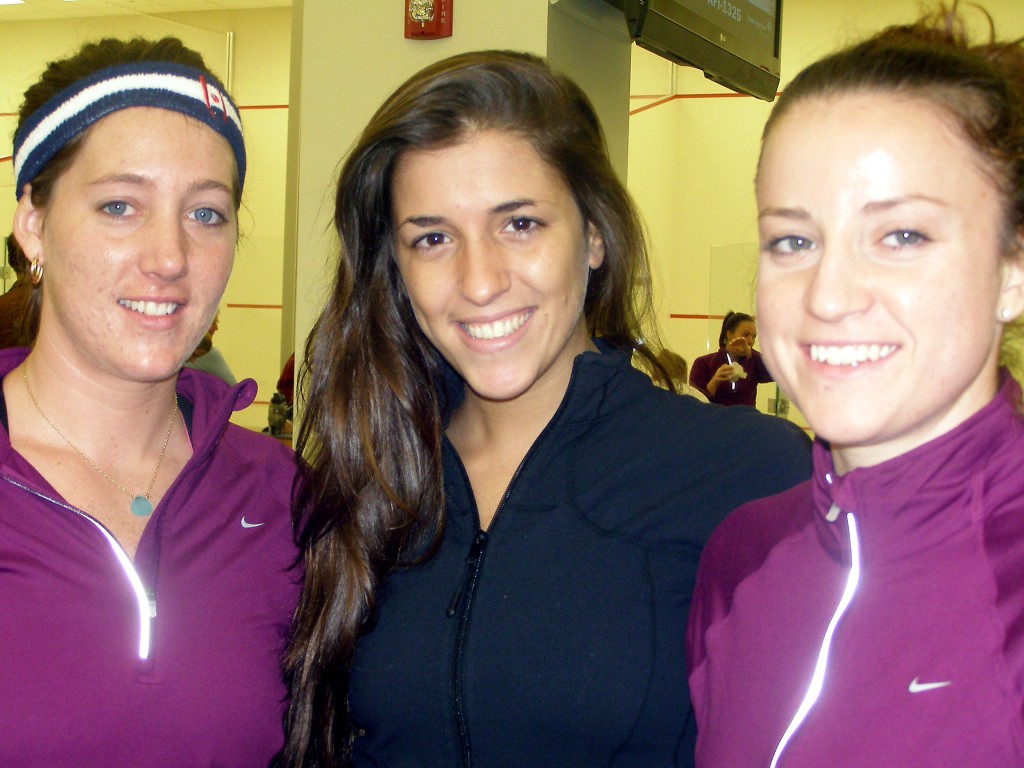
Laurie picked up the game when she happened upon the squash courts at Hopkins where she was working as a nurse after graduating from the University of Maryland. “Someone handed me a racquet and ball, and a while later I started taking lessons.” Laurie’s love of the game was picked up early by her daughters, Hollis, 17, and Parker, 15, who recall running around the squash courts at Meadow Mill when they were seven and then taking lessons a few years later. Both girls played field hockey, lacrosse and soccer, but have now chosen to focus on squash.
A Howe Cup participant on and off since 1980, Laurie played at the No. 2 spot on the Baltimore C1 team and was joined by younger daughter Parker in the No. 4 slot. Hollis, who played in her first Howe Cup two years ago at age 15, was No. 2 on the Baltimore C2 team. The sisters are teammates on the Bryn Mawr School team, where last season Hollis was No. 3 and Parker No. 4. Asked what happens when they play each other, Parker replied, “It is such a mental game. Hollis is composed and calm and I’m yelling.” Hollis noted, “I just try to forget it’s her.”
Asked about playing their mother, all three Millers burst out laughing. “Once I beat her,” Parker said. “I’ll never forget it. Mom definitely has a better boast, but I have better rails.”
The Millers trained together for Howe Cup and the sisters find that it is a great way to get ready for the squash season at school. The Miller girls are as delighted as their Mom to be playing together on the Baltimore teams. “I love it—having them as teammates and friends,” Parker said. “But I get so nervous watching them play.”
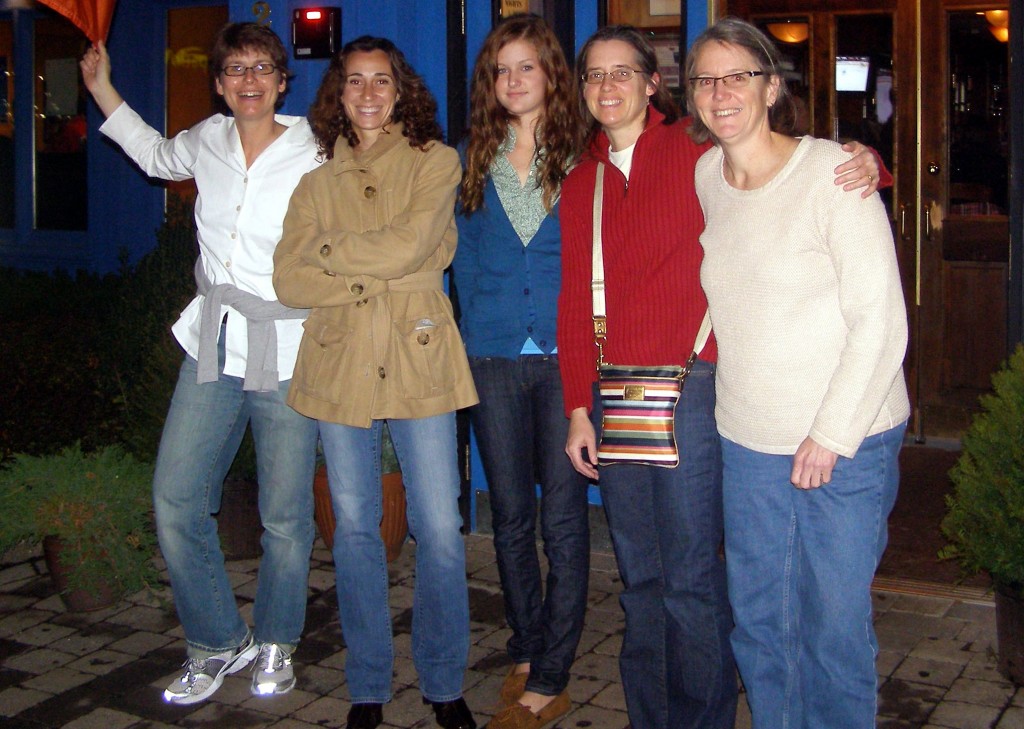
California Girls (by way of England, Australia, Nigeria, Norway, Jamaica, Canada…)
Under the leadership of Kim Clearkin, assistant pro at the Pacific Athletic Club, California fielded A, B and C teams whose diversity and dynamism were distinguishing characteristics. “We joke that there aren’t any Americans on our team,” Clearkin says with a laugh. While not completely true, the majority of the California team members originally came from somewhere over the ocean.
Clearkin, a native of Reading, England, started playing squash 25 years ago at university and finds the sport compelling after so many years because, “it is physical and mental. You can’t win just by being fit or just by being smart. You have to be both.”
Jocelyn Blakemore, whose original home was Liverpool, came to the States to study acupuncture. She picked up squash at 27, but then didn’t play for 20 years until she heard a radio ad promoting a club in San Diego with squash courts. Blakemore didn’t sit back during her non-squash years; instead she took up BMX racing with her son, and was ranked No. 2 nationally. As for her return to squash, Blakemore says,” I’m over my head in training, but I love it. I’m totally addicted.”
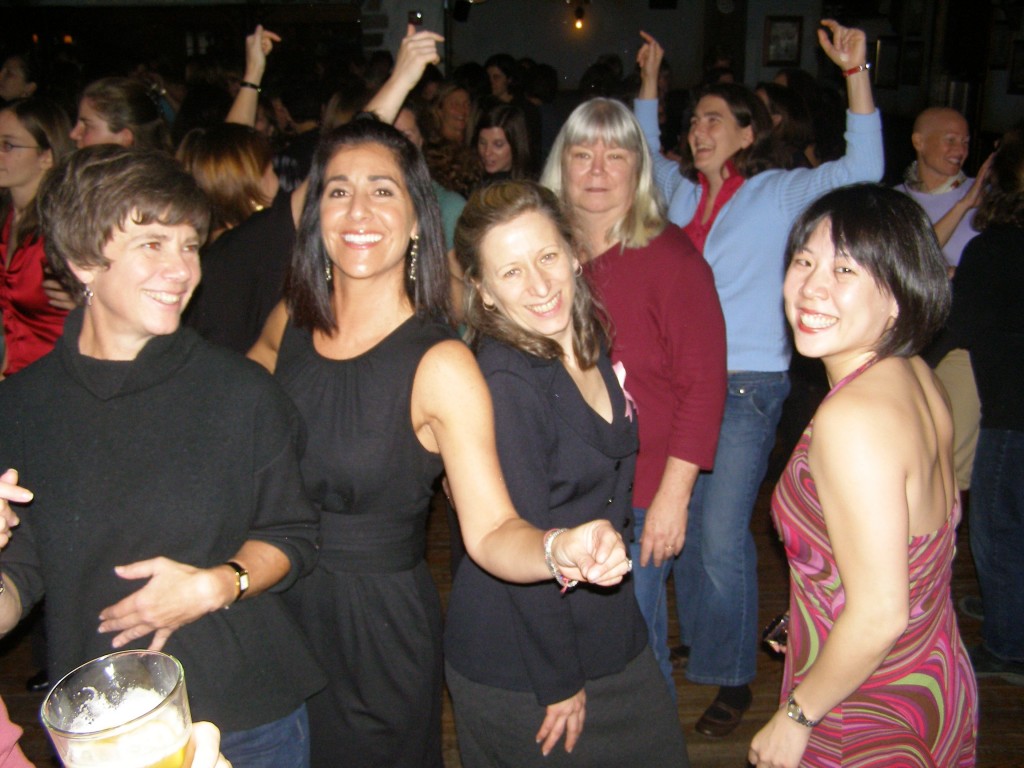
Astrid Terry was born in England but grew up in Jamaica where she first played squash. She made her way to California to study at UC Santa Cruz. After a 20-year squash layoff, Terry started playing again at the Bay Club with her twin sister. “I love Howe Cup,” she exclaims with enthusiasm. “All these athletic women sweating up a storm. The standard of play is so high, I am motivated to go home and train.”
Wilda White, one of the few American born players on the California team was a track and field athlete at Exeter and the University of Vermont. White traded the New England cold for sunny California and a year ago started playing squash at the Bay Club, where she met the Terry twins. With the twins as regular playing partners, Wilda has a rapidly improving game.
Rohine Jupta grew up in Nigeria, and began her squash career at the Milton School. She played at U. Penn, having been recruited by Demer Holleran who was the Penn coach when Jupta was applying to college. Rohine moved to San Francisco after graduation. She described Howe Cup as “competitive squash with a fun edge” and vowed to fly in a day early next year to avoid the sleep deficit and jet lag that the Californians struggled with in the first day of competition.
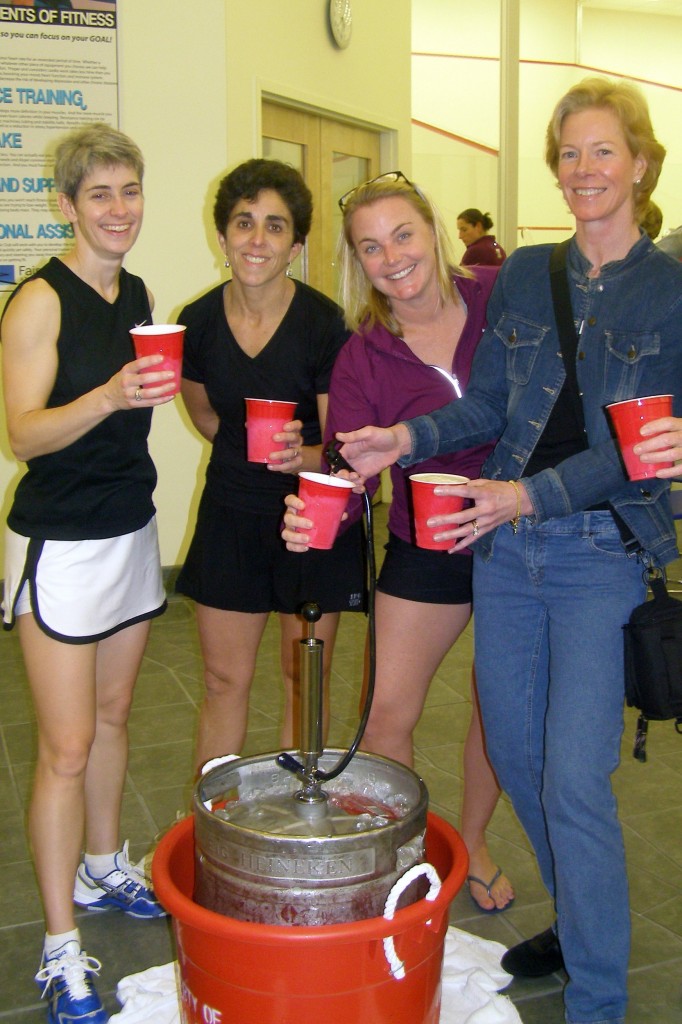
Carolyn Kahn hails from New Jersey and first started playing squash at the New Haven Lawn Club. A keen soccer player, Kahn has played a retrieving game, but is now taking lessons to refine her technique so “I can play for 20 more years.” A research scientist and venture investor, Kahn currently owns a company which plans to launch its first product in May, a self calibrating pH sensor. Perhaps the biggest advantage of being the boss, however, is that “I can sneak out of work to play.”
Norwegian born Ma Patapoff was given a squash racquet for Christmas by her husband two years ago. She enjoys the intense workout—“the physical, mental and emotional challenge”—and playing with her husband, Ma says with a grin, “is a great way to work out marital problems.” As for her first Howe Cup experience, Ma says, “”It is great to see a lot of good female squash players, although it is also humbling.”
Elaine Friedland was born in England, moved to South Africa at 16, made her way to Canada 13 years ago and landed in San Francisco in 2005. “I took up squash later in life,” Friedland says. “My husband signed both of us up to play squash at the Vancouver Racquet Club 10 years ago.” The nomadic Englishwoman likes the intense workout and the social aspect of squash. “You get to work out with somebody you like—and have lots of laughs.” Friedland’s Howe Cup assessment? “We don’t get to play a lot of other ladies, so this is both stimulating and humbling.”
Jacinta Corbett was born in Malaysia and grew up in Perth, Australia, first playing squash at Curtin University with her then boyfriend, now husband. There was no lack of squash players to admire when Jacinta started playing—Aussies Michelle Martin and Sarah Fitz-Gerald were dominating the women’s pro circuit then. Although her husband is her biggest cheerleader and a good coach, Corbett confesses that they cannot be on court together. As far as Howe Cup is concerned, Jacinta says, “I love watching and learning from all these women.”
